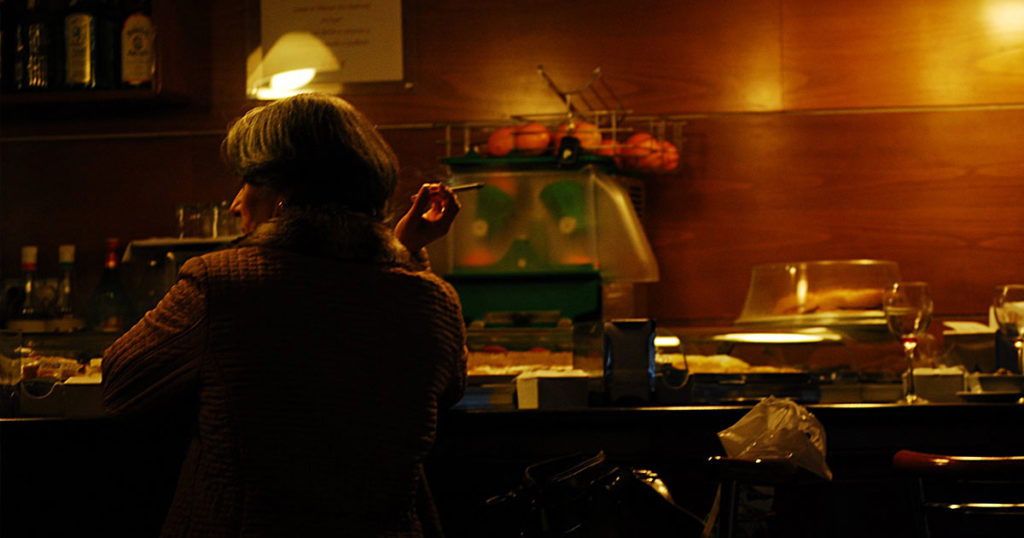
“What shall we do?” was the question I told the two students in my adult beginners class to ask each other. Shall has no equivalent in Spanish, so instead of offering a translation when asked what the word meant, I told the students that it’s a modal verb used for making suggestions or offers in the form of a question. They knew as much already because they’d seen the word in use in the book’s grammar lesson, and from their faces I saw my answer didn’t add any clarity. What they wanted was why it’s so. After a moment of frowning thought, one of them, speaking Spanish, conceded, “So that’s just how it is.” Yes, I agreed, that’s just how it is.
We’d lost our momentum, so I provided a push in the form of an example. First, I reminded them of the book’s three possible responses: Yes, that’s a good idea, or Maybe, or No, I don’t think so. “Shall we go to Madrid for a drink at El Chicote?” I asked. Then I waited.
For months—for years it seemed—we’d been doing pair work exercises conceived of in a time before Covid, when people actually had a life that involved more than going to work, doing the shopping, and hurrying home again. Questions from the book about how they had spent New Year’s Eve or how they’d celebrated their birthday or what they had done last weekend met with guffaws on good days or sighs on the bad ones, when there seemed no end in sight of the precautions, restrictions, and fear that were keeping us close to our homes. Would new textbooks one day work the pandemic into the lessons? This book updated for pandemic times might include a fourth possible response: “Are you out of your mind? We’re on city confinement with a nightly curfew!” With luck, though, there’ll be no need to teach future students questions suited to enduring a pandemic. Meanwhile, we laughed at the idea of a weekend trip to Madrid for a drink at the bar Chicote. Madrid! A drink in a bar! Ha, ha, ha!
They knew the bar, naturally. What person familiar with Madrid doesn’t? It’s on the Gran Vía, in the city’s center, famous for having been frequented by Hemingway, among other illustrious customers. I’ve been there myself. So when I read about it recently in connection with the famous bullfighter Manolete, who was introduced to the aspiring actress Lupe Sino there one evening in the early 1940s, I tried to picture the scene. What I pictured, of course, was the bar Chicote I had entered in the late 1980s, a post-Franco bar, not the posguerra bar of the 1940s. How would the two differ, I wondered, and how would they differ from the bar that Hemingway knew when he was in Madrid in ’37 and ’38?
According to accounts I’ve read, the bar has remained much the same. Could that be true? Even if the art deco design has been preserved through the many decades and upheavals, what about the atmosphere? In 1931, the year the bar opened, the king, Alfonso XIII, was deposed and the Second Republic was established but shaky. In 1937, in the middle of the civil war in Republican-held Madrid, desperate inhabitants endured under siege, banners in the street announcing “No Pasarán,” they won’t get through. They did though, and in the early ’40s, in the midst of Franco’s repressions and reprisals, people suffered further hardships. When I visited the bar, with Madrid booming, freedoms and rights that hadn’t existed for the previous generation were already taken for granted. If nothing else, the air that you breath in such a place has changed. Gone the clouds of cigarette smoke. Also gone the fear, gone the glamour, gone the clandestine whispers, gone the atmosphere of … of atmosphere!
The bar has a revolving door, the kind that takes a moment longer to traverse than a regular door and that should portend a change, an adventure on passing through it. But I think the best I could do returning to Chicote’s would be to evoke my own past, not anyone else’s. Even that voyage in time isn’t guaranteed. If, on trying, I should fail, I’d give a sigh on a low day, a guffaw at my silly expectations on a good one. Either way, the conclusion would be the same: that’s just how things are. I’d like to try though. When the air has again cleared. “Shall we go to Madrid to celebrate the defeat of Covid-19?” “Why not?” was the answer I wanted. Let’s hope the posguerra of the virus is better than Franco’s posguerra.

